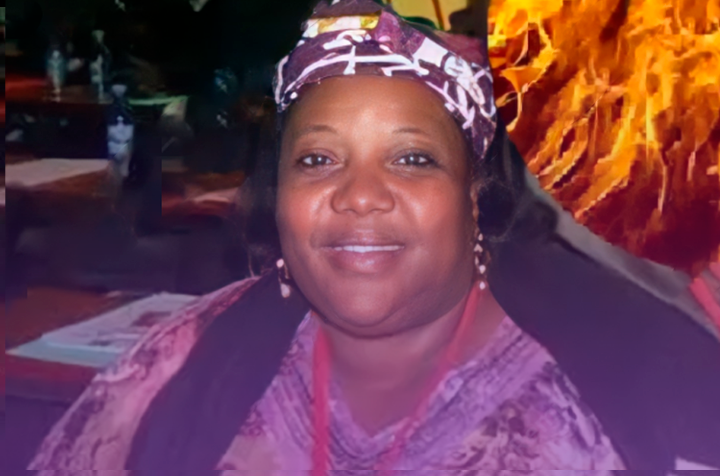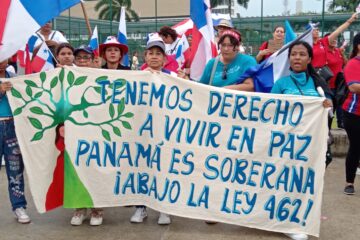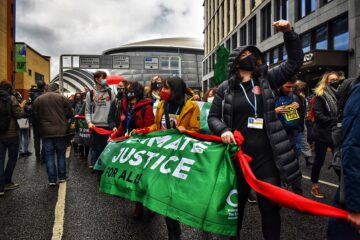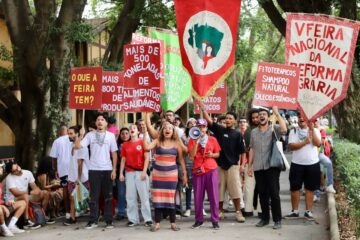On July 31st, we celebrate African Women’s Day, a date created at the African Women’s Conference held in Tanzania in 1962, as part of the processes of struggle for anti-colonial liberation on the continent. Today, across the vast African territory, women struggle for emancipation. They come together to sustain life while also building feminist perspectives to fight new forms of colonialism and capitalism, racism, and imperialism.
To remember and maintain the lessons learned from and the stories of change of African fighters, today we publish the profile of the Mozambican feminist militant Maria Adosinda de Almeida, who passed away in 2017. Maria Adosinda was a militant of the World March of Women (WMW) in Mozambique and the founder of the Association of Disadvantaged Women of the Sugar Industry (Associação das Mulheres Desfavorecidas da Indústria Açucareira—AMUDEIA), an organization created in 1996 after a strike staged by women who were fired by the sugar company Maragra.
I am Maria Adosinda. Here at AMUDEIA, I think I am very happy. Ever since I worked at the sugar company Maragra, I have always made laws to improve conditions for all working women. This is what the association is about: all these women are from this core, they are all my fruit and they all know how to speak and what to do. (…) I do not go to the association anymore, I will just say goodbye and do my things, because all these women are well there in Nampula, in Beira, they are all well! I have a lot of experience, so I brought that to them. All of them know, now I am really tired. (Maria Adosinda, interview granted to the researcher Vera Fátima Gasparetto in 2017.)
Feminist Leadership
In the struggle for the rights of the women workers of her community and against the exploitation perpetrated by the sugar industry in the city of Manhiça, Adosinda founded the AMUDEIA. She built the World March of Women in Mozambique since the beginning of the organization, in the 2000s. She was a member of the Coordinating Body of the WMW in Mozambique. According to Graça Samo, a former International Committee coordinator at the WMW, Adosinda was “the woman who led the most struggles on all fronts, and the first to advocate that Mozambique should accept the invitation to host the WMW International Secretariat.” In 2016, the AMUDEIA was one of the organizations that mobilized and hosted the 10th WMW International Meeting, which took place in October that year in Maputo.
Adosinda was a fighter and a mobilizer. Everyone would stop to listen and pay attention whenever she raised her hand during a meeting. “When I meet women who knew her, they always say ‘we lost a mother, a leader.’ She was struggling until the end. No topic was left unaddressed. She challenged the men when she felt they were violating her right. Here in Manhiça, people considered her an oppositional woman, who came to shake up conservative policies,” Dulce Catarina, Adosinda’s daughter and executive director at AMUDEIA, told us. This opposition effectively meant Adosinda’s revolutionary struggle against the Mozambican conservative culture and traditionalism. Dulce explains that, “in men’s minds, she was putting ideas in women’s minds, enticing them to wrong things. Actually, what she was doing was teach women to speak for themselves.”
Maria Adosinda struggled to show people that oppressions were not natural and that her desire was for women to be free, so that they could live a violence-free life, know their rights, and occupy political spaces in their communities. She also wanted men to know women’s rights and respect them. About marriage, for example, Dulce Catarina said that, “in Mozambique, while marriages are monogamous, men want to have several wives. Through education and information that Adosinda and the organization provided to women, they would not accept men who wanted two or three wives. So they [the men] would say, ‘Adosinda is spreading bad concepts.’”
Stories of Struggle
Dulce Catarina shared a memory of when her mother was struggling with her sisters for policies to fight domestic violence. Despite persecutions and obstacles, the feminists—united and resistant—formulated new forms of organization to defend women’s lives. “The strategies Adosinda used were many and very creative. She really did everything so that women could fight and enjoy their rights,” Dulce says.
“When we opened the domestic violence office to assist victims of domestic violence, it started to assist a group of women. At that point, the president of the municipality wanted to build a supermarket in an area where people who had fled the war were living. Initially, he did not want to relocate this population, who were mostly women who had lost their husbands to the conflicts. The women resisted the displacement and the government proposed to take the families somewhere else. The area to where they would be taken had no electric power or drinking water, and it was hard to reach. A group of women who seemed to be marching came to the AMUDEIA to demand that they stayed in their lands and houses. As they marched, Adosinda received threats in case she welcomed those women.
We brought these people together and submitted all their cases to another organization. Those women could not remain unassisted. Our strategy was to use the face of this other organization that could not be threateneed, because it was from a different place, while we would be the ones providing the support those women needed. All their demands were presented, such as the building of a road to provide access to the new area they were being relocated to, the provision of electric power, water, and sanitation, and better quality homes. We accomplish a lot of these demands and, moreover, a school was built so that their children could continue to study.”
The AMUDEIA
The organization was established to support women who had been fired from their jobs in the sugar industry in Mozambique. Women workers had no right to rest. They had to take their children to work, but they could not take care of them, and when they did not produce what the company considered enough, they were fired without compensation.
In addition to organizing mobilizations and strikes for labor rights, over the years the association created and strengthened alliances in a network of collaboration and cooperation with the feminist movement and organizations of urban and rural women. It then became a space to where women were assisted and could learn about the violence they suffered and the anti-patriarchal struggle. In alliance with the Woman Forum (Fórum Mulher), a Mozambican organization that is also a member of the World March of Women, the women mobilized to have a law passed to fight domestic violence—they accomplished it and the law has been in force since 2009.
The AMUDEIA also works providing education to children, young women, and adult women. For the community, the association is a network of solidarity and discussion, especially addressing topics regarding body, sexual and reproductive rights, and the building of feminism. Its militants believe that political education is one of the paths women must tread as they pursue their autonomy and liberation from patriarchal oppression.
____________________________
This article was written based on information provided by Dulce Catarina to us during an interview as well as information from the doctoral dissertation by Vera Fátima Gasparetto, “A Corridor of Knowledge: Vavasati Vatinhenha (Women Heroes) and Networks of Women and Feminists in Mozambique (Corredor de saberes: vavasati vatinhenha (mulheres heroínas) e redes de mulheres e feministas em Moçambique), from the Federal University of Santa Catarina, 2019.




